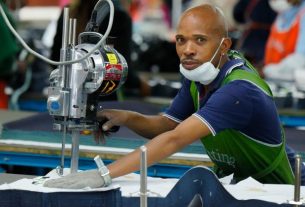Israel’s tech industry has gained international recognition for its innovative start-ups, cutting-edge technology, and entrepreneurial spirit. But beneath the glossy surface are concerned employees who wonder when they’re going to age out of the competitive, youthful landscape.
The average age of an employee in the Israeli hi-tech industry is about 40 (and climbing as the market develops), yet some veteran workers are concerned their age could interfere with their livelihoods. Surveys and researched news articles from the past two years have shown that tech employees in Israel fear that by 45 they will be aging out of Israel’s highest-paid industry. And while reports from the Israel Innovation Authority show the field is becoming more welcoming to older employees, many in the work force feel anything but forthcoming about the year they were born.
Most people interviewed about their work environment were hesitant to offer their names and even more hesitant to share the number of years they’ve been in the biz.
Moreover, younger employees managing older ones were outright afraid to be named in such an article out of fears that they would stoke the flames of antagonism among teammates if their group included a person over 40.
Do older hi-tech workers fear ageism?
Bruce Zivan is a 60-year-old tech manager who prides himself on treating employees fairly and making sure expectations are transparent, regardless of the person’s age or background. He reflected on his 15 years in the Israeli tech space for the Magazine. Coming from the US as an adult, Zivan shared some brow-raising stories about companies he wouldn’t dare mention by name.
The VP of sales told a tale of an interview he took with a company CEO who liked him and wanted to hire him on the spot, but needed to bring in his would-be direct manager for approval and sign-off.
“He leaned over and whispered to me, ‘Are you willing to work for a woman?’” Zivan said. “She comes in and she is 25 [years old].”
Zivan believes the boss was making assumptions about him because he was wearing a kippah, indicating a Torah-observant lifestyle. As an Orthodox man, he reasons that it had displayed an erroneous message about his comfortability working closely with women. More shocking for him than being asked if he would work for a woman, he said, was actually the idea he’d have to work for someone the same age as his children.
“Personally, have I experienced it [ageism]? I don’t believe so, but no one is stupid enough to say ‘I am not hiring you because you’re too old,’” Zivan said.
“I think it’s much worse in software development, where people are all young, coming out of the army, and for a person who comes here even in their late 30s or 40s, it’s going to be tough. They can say you don’t fit the environment.”
While Zivan is in good health and has an abundance of energy for his role, he recognizes ageism could potentially rear its “ugly head” in the future and commented on how experienced employees can actually be the boost many companies need.
What do Israel’s young tech managers say about ageism in the workplace?
To hear the other side of the story, the Magazine reached out to young managers (under 30) in the tech space, finding only one who would speak out loud about their experience. He comes from an analytics company and wanted to remain anonymous – out of fear he would be misrepresented – especially when speaking about managing people who were older than him.
The programmer gave the “manager life” less than a year before realizing he wanted to go back to hands-on work – and potentially return to the management role down the line, with some more experience. For him, supervising people (especially those older than him) felt inauthentic. Ultimately, he decided to return to software development where he felt he could worry more about the engineering and less about the needs of the team.
He did, however, explain that when having feedback talks with older employees he would make an effort to come across in an “extra open” manner in order not to insult or humiliate them.
Other than our unnamed analytics employee, few managers who worked with the older population wanted to speak about their efforts in connecting with their employees in the workplace. Some even suggested it was due to a “dislike” of managing outside of their age bracket, but would not give details as to why.
For the experienced workers, young managers are just a symptom of a greater problem – young founders getting an inflated ego after coming into some investments for their ideas and then, worse, bringing their inexperienced buddies along for the ride.
LONGTIME TECH worker Greg Salter is currently an Enterprise account executive, but has been in just about every tech role in the game. He gave an emotional interview as he reviewed his challenging and sometimes tumultuous career in Israel over the last decade.
Salter said while he feels he is just now stepping into the most experienced and confident place in his career, he often shies away from sharing his age and intentionally focuses on leading a healthy lifestyle so he can show up sharp and even look good while on the job.
“With my age and experience, I know I can run a business development team, sales development team, and account management team. I understand all the areas and I feel I could oversee all the departments. Companies are reaching out to me about director roles,” Salter said.
While Salter is ready for a big move, he finds with tech companies in a constant state of hasty hiring and firing it can be hard to plant your feet down into a company, unless, of course, you run it.
The average age of Israeli start-up founders is about 41 in Israel, (among the youngest around the globe for this role). Both Salter and Zivan independently stated that they believe a company’s culture is highly affected by its founder – and referenced dealing with young, inexperienced top dogs who they described to be in their 30s with a lack of experience and polish.
“In general, I find people are in positions because of who they know and not what they know. How did they get that position? Luck and timing. I think management needs to be more in touch and in tune. You might have a great product, but management has never managed before. They are not in touch with the foot soldier. They don’t hear our voices,” Salter explained.
He went on to share that while most of the companies he worked for had a human resources department, he felt it wasn’t a safe place to bring concerns. That sentiment came up in multiple testimonies by tech employees during the research for this article.
“Small country. Small people. Close-knit. You have got to be careful,” Salter suggested.
He also says that he can easily pass for a decade less than what he looks and he works to protect that image.
“Hi-tech is brutal. Being old in hi-tech just does not work. Everyone who works with me is younger than me,” Salter said.
“I have had some difficult times. I’ve been yelled at in front of everybody. I have seen a lot in the amount of time I have been working in Israel. The key is to stay low.”
For Salter, an immigrant to Israel, having weak Hebrew has been a part of what he believes keeps him out of company drama. He reported seeing inappropriate flirting at office parties and even untoward behavior coming from upper management.
Inappropriate parties, social activities in Israel’s tech scene
INAPPROPRIATE PARTIES were a motif during the research for this article, with employees sharing experiences that they could not voice before. Stories of camping trips where employees were made to sleep in mixed-gender tents, uncomfortable social invitations or even mandates to attend off-color company events, have come up on multiple occasions during this research.
One anonymous young woman told the Magazine that the founder of Graduway, a company that provides a social network for universities, tried to pull together a singles party in an effort to marry off his young, single employees. The interviewee goes by Sadie for the sake of this article.
“He sent an email to all the singles in the company, or people who he thought were single. He investigated and invited them all to a meeting in his office. HR was present. He said ‘I will make a party where you need to bring two friends of the opposite sex,” Sadie said.
“At the time, I was seeing someone, but was told to come anyway because I wasn’t married.”
Sadie said her colleagues at the office were in shock, with some people very upset. Some made it clear they did not want to attend the party but were told it was mandatory. For unclear reasons, the event was never executed.
The Magazine reached out to the company for comment and learned the founder of the organization is “no longer associated with the business” that was “transformed into Gravyty through a merger.” The founder’s LinkedIn page says he is a board member, but the company says otherwise.
“So many owners are creating start-ups with no management skills. They get an idea and create a company and don’t have business management courses. I think the boss thought he could be everyone’s ‘friend,’” Sadie said.
Following this experience, Sadie worked through another three unprofessional Israeli start-ups before landing in a respectful, supportive, and cooperative workplace. She says that in those previous roles, she felt depressed and overworked. In addition to the work stresses, she felt that because she was a new immigrant bosses took advantage of the fact that she was not familiar with her rights.
Just under 15% of Israel’s workforce is in the tech industry which makes up more than 15% of the country’s GDP. With a big evolution in the tech world and repeated waves of indiscriminate firing due to a rapidly changing economy, it seems that investors today giveth and taketh away.
Resounding notes of advice from those who participated in this article are to keep your age to yourself and always be open to your next opportunity.



